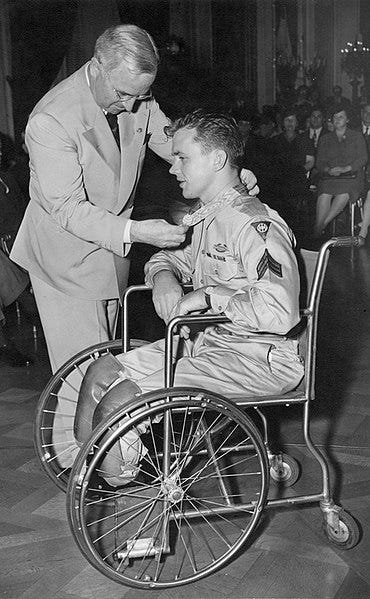Iowa man of honor didn't need legs to stand tall
Double amputee, WWII hero Ralph Neppel of Carroll County served fellow vets in Waterloo, Iowa City

Ralph Neppel was as good as dead.
He lay slumped over his hot machine gun in the snow. One of his legs was gone below the knee; the other was a shattered pulp. One of his bloody combat boots lay some distance away. He felt the ground shake as a German tank rumbled toward him as he lay on his belly in the gravel road.
Minutes earlier, that tank had fired an 88mm shell that had destroyed his legs and killed 10 other soldiers. It had blown him into the air and he collapsed in a heap, feeling the searing pain of hot shrapnel in one hip. He had dragged himself 10 yards on his elbows back to his machine gun and pumped two 250-round belts of ammunition into the tank and two dozen German soldiers crouched around and behind it.
Now, he was out of bullets. Twenty Germans were dead, but the tank kept coming.
He heard the crunch of footsteps in the snow approaching him. Peering from under his helmet, he saw the black boots of a German officer. The officer drew his Luger pistol and pointed it at Neppel's head. Then he fired.
That was Dec. 14, 1944.
Eight months later, Neppel sat in a wheelchair, legless. A gray-haired bespectacled man took a medallion from its case and draped it around his neck.
Neppel was sitting in the White House. The medallion hanging around his neck was the Medal of Honor, the nation's highest combat decoration for valor "above and beyond the call of duty." The gray-haired bespectacled man was the president of the United States.

"I'm proud to place this medal on you, son," Harry Truman whispered in Neppel's ear.
Neppel heard the president's words just fine. He had recovered from the hearing loss and head pain he suffered from the German officer's pistol shot. It had pierced his helmet, but only grazed his skull.
A comrade of Neppel's shot the officer, and other U.S. troops rallied and forced the German tank to withdraw.
Neppel spent the rest of his life on artificial legs, but never let the disability impede him.
A native of Willey who grew up on a farm near in Glidden in Carroll County, he and his wife, Jean, married in 1946. Neppel returned to farming for a time after the war, bolstered by a $15,000 fund drive promoted by the Des Moines Register and Tribune to help him and his family. Then he went to work for his fellow veterans and persons with disabilities.
He got a degree from Buena Vista College in Storm Lake and went to work for the Veterans Administration, first in Des Moines, and then in Waterloo where he and Jean lived from 1954 to 1964. They raised four children while Ralph worked as a contact representative for the V.A.
In I962, Neppel took a position with the the Veterans Administration Hospital in Iowa City, where the family eventually moved.
He had been invited to President John F. Kennedy’s inauguration in 1961 and attended the president’s White House reception for Medal of Honor recipients in May 1963.

Neppel also served for eight years on the Iowa Governor's Committee for the Employment of the Handicapped and was Named Handicapped Iowan of the Year by Gov. Robert D. Ray in 1970. Neppel retired from the V.A. in 1971.
He also sold real estate, operated a Johnson County propane company and never gave up farming per se, keeping a large two-acre produce garden, giving his grandkids a tractor ride or a pull on a sled in the winter. He also was a notorious practical joker and self effacing about his disability. He kept artificial legs of different lengths to befuddle folks as to his height, and once kidded to a Waterloo Courier reporter he didn’t have to worry about wearing out socks.
In 1989, two years after he died of cancer at age 63, a new wing of the VA Hospital, dedicated to fellow disabled veterans, was named after him. The dedication that June included an assembly at Carver-Hawkeye Arena prior to the dedocation at the hospital.
An Iowa City Press-Citizen editorial noted that, shortly before his death, he returned to Germany to visit a son working there. A baseball diamond bearing his name had been built where he had fought four decades earlier.

Iowa Writers’ Collaborative Columnists
Laura Belin: Iowa Politics with Laura Belin, Windsor Heights
Doug Burns: The Iowa Mercury, Carroll
Dave Busiek: Dave Busiek on Media, Des Moines
Art Cullen: Art Cullen’s Notebook, Storm Lake
Suzanna de Baca Dispatches from the Heartland, Huxley
Debra Engle: A Whole New World, Madison County
Julie Gammack: Julie Gammack’s Iowa Potluck, Des Moines and Okoboji
Joe Geha: Fern and Joe, Ames
Jody Gifford: Benign Inspiration, West Des Moines
Beth Hoffman: In the Dirt, Lovilla
Dana James: New Black Iowa, Des Moines
Pat Kinney: View from Cedar Valley, Waterloo
Fern Kupfer: Fern and Joe, Ames
Robert Leonard: Deep Midwest: Politics and Culture, Bussey
Tar Macias: Hola Iowa, Iowa
Kurt Meyer, Showing Up, St. Ansgar
Kyle Munson, Kyle Munson’s Main Street, Des Moines
Jane Nguyen, The Asian Iowan, West Des Moines
John Naughton: My Life, in Color, Des Moines
Chuck Offenburger: Iowa Boy Chuck Offenburger, Jefferson and Des Moines
Barry Piatt: Piatt on Politics: Behind the Curtain, Washington, D.C.
Mary Swander: Mary Swander’s Buggy Land, Kalona
Mary Swander: Mary Swander’s Emerging Voices, Kalona
Cheryl Tevis: Unfinished Business, Boone County
Ed Tibbetts: Along the Mississippi, Davenport
Teresa Zilk: Talking Good, Des Moines
To receive a weekly roundup of all Iowa Writers’ Collaborative columnists, sign up here (free): ROUNDUP COLUMN
We are proud to have an alliance with Iowa Capital Dispatch.

